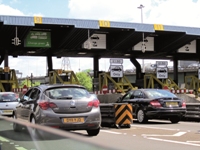
The tolls at the Dartford River Crossing should be scrapped to help boost the local and national economy, the South East Local Enterprise Partnership (SELEP) has said.
The call comes in its response to the Department for Transport’s (DfT) consultation on proposals to raise the charges at the crossing. The government is planning to phase an increase in tolls to £2.50 for cars and £6 for articulated lorries next year.
SELEP believes that the proposed increases are ‘excessive and unfair on all drivers and businesses who are already being hit hard by the recession’.
However, should the government press ahead with its plans, SELEP has called for the discounts currently offered to Dartford and Thurrock residents to be extended to neighbouring boroughs and businesses.
The Dartford River Crossing, connecting Essex and Kent, is one of Europe’s most heavily used crossings with more than 200,000 vehicles a day using the Queen Elizabeth II Bridge and the two tunnels.
If the government retains the tolls, SELEP has called for:
- no increase in charges to be introduced until free-flowing charging, similar to London’s congestion charge, is installed. SELEP believes this could be paid for using the current income generated by the crossing;
- any increases in charges to be introduced in one stage, rather than the planned two, to avoid confusion and extra costs to businesses;
- greater discounts to be offered for using the Dart-Tag pre-paid toll charge system to encourage greater take up of the scheme; and
- the continuation of the free period for using the crossing between 2200 and 0600hrs.
Interim chairman of SELEP, George Kieffer, said: “It is not rocket science to see the toll booths act as a major traffic bottleneck which can have a huge knock on effect for the surrounding road network including the M25, A2, A13, and A127. This is not good for any motorist but can have devastating effects on businesses especially in this economic climate.”
For more information on SELEP contact Stewart Henderson on 01245 433150 or [email protected]


